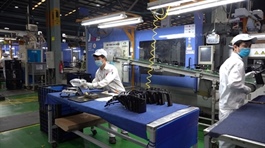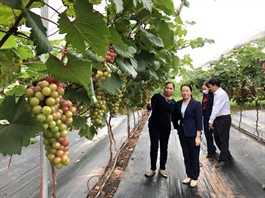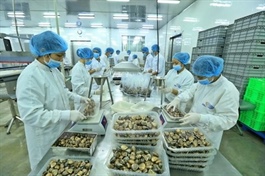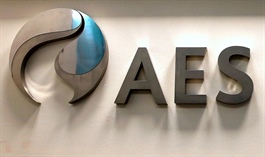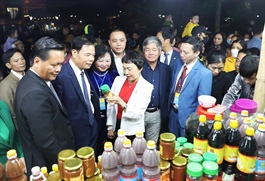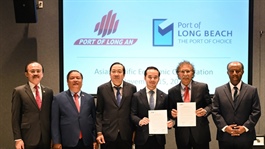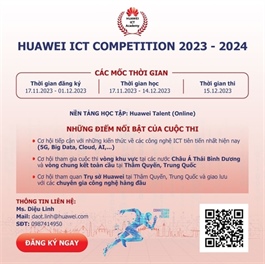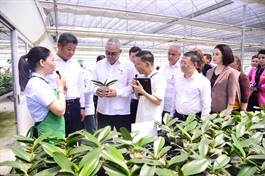Japanese tech giant taps into Vietnam's talent pool
Japanese tech giant taps into Vietnam's talent pool
Hiroaki Ishihara, deputy general director of Rakuten Fintech Vietnam, has expressed optimism that Vietnamese engineers will make significant positive contributions to his company in the future.
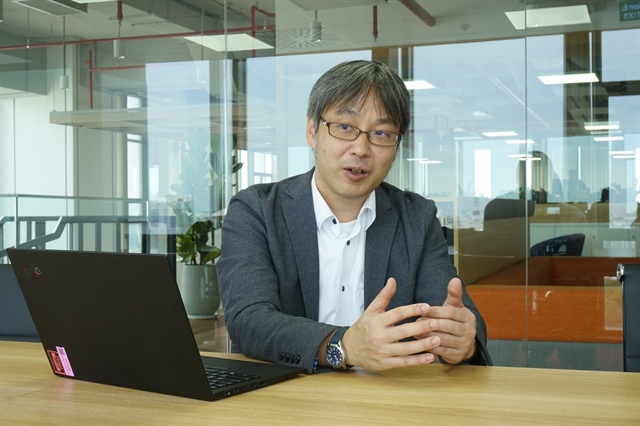
Hiroaki Ishihara speaks with Tuoi Tre at Rakuten Fintech Vietnam’s office in Ho Chi Minh City, November 17, 2023. Photo: Nghi Vu / Tuoi Tre |
“Vietnam has many young and talented engineers. It’s a great fit for us,” Ishihara shared his view on the quality of Vietnam's information technology (IT) talent pool during an interview with Tuoi Tre (Youth) newspaper in Ho Chi Minh City on November 17.
The IT workforce of Vietnam is increasingly attractive to Japan, a country that is facing the burden of labor shortages and an aging population.
Rakuten Group, a technology conglomerate renowned as the 'largest e-commerce empire in Japan,' is among the Japanese enterprises that tap into Vietnam’s human resources.
What is the upcoming human resources development plan for Rakuten Fintech Vietnam?
Rakuten Card established Rakuten Fintech Vietnam as a development center in October 2021 with the goal of driving sustainable growth, accelerating system development for its expanding service lineup, and supporting business continuity planning for the IT systems that form the foundation of Rakuten Card’s services.
But now we are developing not only customer service systems but also the merchant system. So we can say we have been gradually expanding our scope.
We have around 75 members here. And by the end of next year, we plan to have over 150 members. There are 65-70 engineers now, while the others are part of the back office.
Of course, we will continue to expand our company size. Now we are focusing on Rakuten Card system development. But in the future, if there is an opportunity, we want to support the other Rakuten fintech group companies as well.
How do you assess the potential of Vietnamese human resources in the IT sector?
Vietnam has many young and talented engineers. It’s a great fit for us. The Vietnamese government has implemented significant measures to support the development of human resources in the IT industry, heightening expectations over the long term for securing and deploying top-tier tech talent within Vietnam. I think we can utilize it.
And here in Vietnam, there's not so much time difference from Japan, and for system development, it is better to have face-to-face communication. So I think Vietnam is a good location from this viewpoint. I mean, for us, it’s a very attractive location.
From a historical viewpoint, Vietnam and Japan have a good relationship. That helped us decide to have the office here.
What plans does Rakuten Fintech Vietnam have to recruit more IT engineers in Vietnam?
Previously we just used hiring agents, but now we have expanded our channels, such as job posting services. We also join universities’ events or job fairs to attract new grads and engineers.
And besides that, we are providing opportunities for engineers to develop their technical skills. We provide courses for the employees to learn more about Rakuten Group services and Rakuten Card services.
We invite guests from Japan or we go to Japan [for them] to have the opportunity to have communication and discussion with the business side. So by providing these opportunities, I think we can attract more engineers to our company.
So far we have had no plans to expand the business in Southeast Asia. For Rakuten Fintech Vietnam, we are a system development company. Now we are focusing on Rakuten Card’s development. So we contribute to Rakuten Card by [providing] engineering resources to expand the Japanese side’s scope.
How can Vietnamese IT engineers improve their capacity and competitiveness?
This is not about improvement, but I hope that the Vietnamese engineers can learn more about the industry of financial technology [fintech], especially the credit card business.
Of course, they know a lot about technology, but as a system development company and a subsidiary of Rakuten Card, I want them to know more about credit cards. When combining business knowledge and technical knowledge, they can contribute more to our business.
At Rakuten, we value open communication, which includes holding huddle-style meetings. It is necessary for us to communicate a lot when doing system development. So it is not only like engineers getting their instructions from the company to do this code and make that code. To make better communication, engineers need to understand what the business strategies are and how the business plan is going to achieve the goal.
So communication is very important. To make better communication, engineers need to understand what the business strategies are and how the business plan is going to achieve the goal. That's also something young engineers in Vietnam can contribute.
For young, talented engineers, they have the opportunity to learn about the fintech business at Rakuten. Of course, we want them to continue supporting our company, but if they understand the fintech business, they can contribute to Vietnam’s fintech industry in the future.
A report published by FPT Digital revealed that Vietnam boasts nearly 400,000 IT engineers alongside over 50,000 IT students graduating annually. However, only about 30 percent of this workforce is deemed capable of meeting practical job requirements.
Within the total workforce of 51 million in Vietnam, the proportion of IT workers stands at an estimated 1.1 percent. This is a relatively low ratio compared to countries oriented toward technological development like the United States, South Korea, or India.



